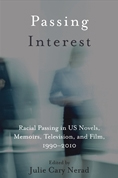Dr. Michael B. Gillespie, Assistant Professor in African American Studies, published “Smiling Faces: Chameleon Street, Racial Passing/Performativity, and Film Blackness” in Passing Interest: Racial Passing in U.S. Fiction, Memoirs, Television, and Film, 1990-2010.
Gillespie’s essay examines Wendell B. Harris Jr.’s Chameleon Street (1990) and the ways that the film’s story of a black “Great Imposter” consequentially poses a critical consideration of issues of racial passing and racial performativity.
 Passing Interest: Racial Passing in U.S. Fiction, Memoirs, Television, and Film, 1990-2010, edited by Julie Cary Nerad (SUNY Press, 2014), is due out July 1. It explores how the trope of racial passing continues to serve as a touchstone for gauging public beliefs and anxieties about race in this multiracial era.
Passing Interest: Racial Passing in U.S. Fiction, Memoirs, Television, and Film, 1990-2010, edited by Julie Cary Nerad (SUNY Press, 2014), is due out July 1. It explores how the trope of racial passing continues to serve as a touchstone for gauging public beliefs and anxieties about race in this multiracial era.
“The first volume to focus on the trope of racial passing in novels, memoirs, television, and films published or produced between 1990 and 2010, Passing Interest takes the scholarly conversation on passing into the twenty-first century. With contributors working in the fields of African American studies, American studies, cultural studies, film studies, literature, and media studies, this book offers a rich, interdisciplinary survey of critical approaches to a broad range of contemporary passing texts. Contributors frame recent passing texts with a wide array of cultural discourses, including immigration law, the Post-Soul Aesthetic, contemporary political satire, affirmative action, the paradoxes of “colorblindness,” and the rhetoric of “post-racialism.” Many explore whether “one drop” of blood still governs our sense of racial identity, or to what extent contemporary American culture allows for the racially indeterminate individual. Some essays open the scholarly conversation to focus on “ethnic” passers—individuals who complicate the traditional black-white binary—while others explore the slippage between traditional racial passing and related forms of racial performance, including blackface minstrelsy and racial masquerade,” says the book summary.


















Comments